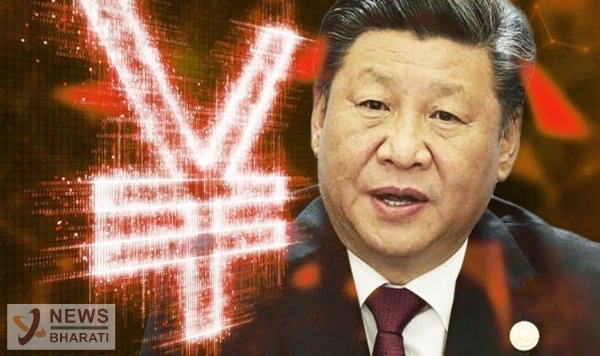Digital Yuan: China's notorious plan for global dominance
In China, Alipay (owned by Alibaba) and WeChat pay (Owned by Tencent) have already popularized mobile payments in early 2010s. However, these payment systems were privately controlled and their growing popularity would have undermined government’s authority.
Total Views |
At the 2022 Beijing Winter Olympics, China not just fought for medals, but also ramped up its efforts to compete with the dominance of Dollar in international market. The Chinese government introduced a pilot digital Yuan/RMB (E-yuan) programme in the Olympic village to rally global support for digital version of its currency. According to an official of People’s bank of China, over $3,00,000 (2 million Yuan) were digitally transacted every day at the Olympics. The modes of transactions included payments cards (ATMs were installed to withdraw cash from these cards), mobile wallets or scannable wristbands. Although, many countries had raised data security and privacy concerns over this, there seems to have a general acceptance of e-yuan among international guests at the Olympics.

In China, Alipay (owned by Alibaba) and WeChat pay (Owned by Tencent) have already popularized mobile payments in early 2010s. However, these payment systems were privately controlled and their growing popularity would have undermined government’s authority. Thus, Chinese government set up a task force in 2014 for the study of digital fiat currency, i.e., e-yuan. After years of research, China unveiled a pilot programme in four cities namely, Shenzhen, Suzhou, Chengdu and Xiong’an in April 2020. The government collaborated with many private companies Didi Chuxing (app-based transportation company) and Meituan Dianping (food delivery company) to promote usage of e-yuan. Recently, this pilot programme has been extended to four provinces in China, indicating its growing popularity among domestic users. At the end of 2021, China had 261 million users of e-yuan. Users were offered cash rewards and merchants were also given incentives to encourage its usage. Further, some cities have also expanded e-yuan for corporate loans and tax payments.
Also Read: EAM Jaishankar praise PM Modi, says his practical attitude has key role in transforming US ties
E-yuan is convenient for foreigners as it does not require an account in Chinese banks. Similarly, the White paper on e-yuan published in 2021 explains that the feature of ‘managed anonymity’ would rule out privacy concerns. It implies that small value transactions would be registered with anonymity whereas only high value transactions would be traceable. Although, People’s Bank of China claims to protect personal information and privacy of users, there are major concerns raised by experts over the excessive control by the government. Robert Murray, a research fellow at the Foreign Policy Research Institute, warns that e-yuan can enable the government to track capital flows and can also impose limitations on currency usage at will. Some China watchers also fear that e-Yuan system can be further linked to China’s social credit system and can facilitate the government to closely govern citizens’ behaviour in future. By promoting Central Bank Digital Currency (CBDC), China will be able to effectively implement ban on cryptocurrency imposed a year ago. More importantly, China’s promotion of e-yuan has global implications as well. There have been deliberate efforts made by China to counter the US hegemony for many years. Replacement of dollar with yuan as a global currency is one of the important components of these efforts. As per 2020 figures, Chinese yuan made up only 2% of world’s currency reserves, compared to dollar which owns more than 70% of global reserves. Introduction of e-yuan at the Olympics must be viewed in that context. It has numerous benefits in terms of China’s dependency on the US monetary policy can be reduced, severity of potential sanctions in case of attack on Taiwan can also be lowered down and China will be able to control international financial institutions like the US does now. China also has certain advantages while promoting Yuan as a strong alternative to dominance of dollar. China is the world’s largest trading country and thus, it is in a position to push for yuan as a currency of settlement. China’s 2019 white paper states that between 2009 to 2019, cross-border transaction in yuan amounted to nearly 20 trillion yuan. Secondly, China’s Belt and Road Initiative is another important project through which China has begun settlement of cross-border transactions in RMB. With the promotion of e-yuan, China will be able to circumvent weak banking systems in developing countries and settle transactions in e-Yuan as it does not need third-party banks. Similarly, since the Russia-Ukraine war began, China has immensely helped Russia bypass western sanctions using yuan as a substitute currency. In Moscow stock exchange, use of yuan for settlement has risen from 0.5% in February 2022 to nearly 26% by August 2022. Similarly, Russia highly relied on yuan for its trade settlements. In fact, even India had also explored the option of buying Russian oil using yuan few months ago. Further, China is way ahead than the US in the race to use digital fiat currency and the gap is likely to increase considering domestic opposition in the US to introduce digital dollar. China has even formed a coalition with Thailand, Hong Kong and UAE to establish multiple CBDC (mCBDC) bridge project to provide an alternative to SWIFT system. Success of this initiative can help China establish yuan’s dominance in Asia.
Despite these initiatives, China faces challenges in making Yuan a global currency. China’s opaque political and economic system, lack of trustworthiness, huge dominance of dollar and partial convertibility of Yuan are some of the major obstacles for China. Further, promotion of e-yuan will create its own problems like data security concerns, China’s negative image as a surveillance state and lack of global experience in using digital currencies. Nonetheless, China has its best shot to internationalize yuan by expediting the usage of e-yuan domestically as well as globally. Whereas, other countries will have to speed up their research and introduce digital currencies before e-yuan becomes dominant in developing and underdeveloped countries. India has also announced the launch of digital rupee in the 2022 budget. However, India has to accelerate its efforts to introduce digital rupee at the earliest and provide a strong alternative to digital yuan.


